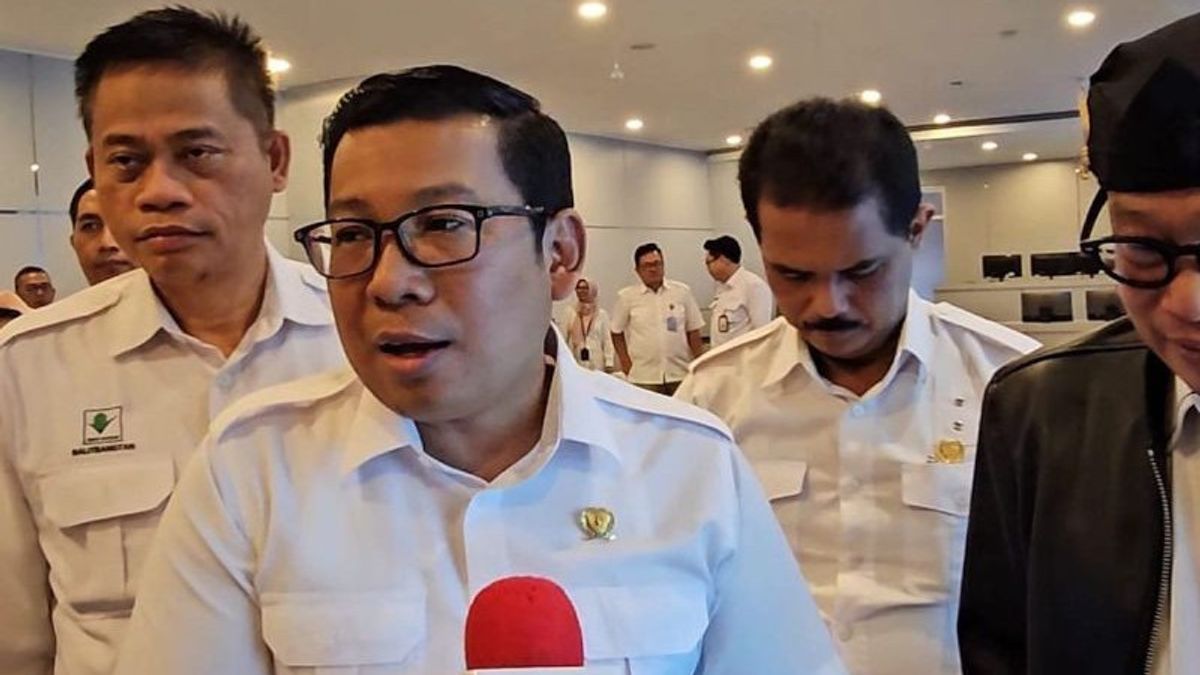JAKARTA - Head of the Agricultural Instrument Standardization Agency (BSIP) of the Ministry of Agriculture Fadjry Djufry said agricultural adaptation to reduce the impact of climate change and El Nino needs to be supported by clear standards and rules so that it can increase the area of planting and rice production.
The adaptation standard includes the use of rice varieties in anticipation of climate change, balanced maturation, water-saving technology, water level regulation on swampland, improvement of animal feed quality, "said Fadjry regarding the activity of 'Civil Change Adaptation in the 2023/2024 Rainy Season Supports Increasing Plantation Area' in Tasikmalaya, West Java, as stated on Saturday.
Other ways of adapting to minimize the impact of climate change, said Fadjry, are the use of Plant Calendar applications and the Standing Crop Information System, the provision of water storage (convex, long storage, dam trenches, and others) as well as the implementation of soil and water conservation.
The event was held by the Ministry of Agriculture's BSIP in collaboration with the Indonesian Agricultural Meteorological Association (Perhimpi) supported by the Tasikmalaya Regency Agriculture, Food Security and Fisheries Service.
Tasikmalaya was chosen as a representative of West Java Province, which is one of the 10 provinces of the National Movement (Gernas) for handling El-Nino.
The ministry under the Acting Minister of Agriculture Arief Prasetyo Adi targets an increase in rice production by 11.9 percent or 35.8 million tons by 2024 which is obtained from the production of 32.11 tons of Dry Grain Giling GKG, an increase of around 13.46 percent compared to the production of ATAP 2022. This production can be achieved through an area of 11.86 million ha harvest, through an increase in the Plantation Index on rice fields and rain fields.
On that occasion, a Joint Planting Action was also carried out in Linggajati Village, Sukaratu District, Tasikmalaya Regency.
BSIP Secretary Haris Syahbuddin, handed over 250 kg of Inpari 32-grade SS rice seed assistance which is the preference of the local community.
This seed can then be utilized by farmers into 500 tons of sebar seeds (ES class) which can meet 20,000 hectares of planting area, 250 kg of ES seeds for 100 ha of land with a minimum production of 5 tons/ha, which is expected to produce 500,000 kg of ES seeds.
The potential for rice fields in Tasikmalaya reaches 51 thousand hectares, consisting of 35,000 ha irrigation fields and 16,000 ha of non-irrigated rice fields.
Head of the Agriculture, Food Security and Fisheries Service of Tasikmalaya Regency, Nuraedidin, explained that local wisdom is still being used in Tasikmalaya Regency in anticipation of climate change, one of which is the use of water mills to drain water from water sources to rice fields which are very helpful in fulfilling water availability.
Meanwhile, Professor of the Faculty of Agriculture, Siliwangi University, Maman Suryaman, explained the importance of the role of Higher Education in research to support the anticipation of climate change.
Maman emphasized the importance of providing organic materials in the form of fertilizers and other organic fertilizers before the soil, which has the ability to hold water for the availability of water for plants.
In addition, Maman also revealed that the results of research in the form of the use of fruit peel extracts (mangosteen, dragon fruit, and others) given into the ground were also able to improve the ability of soil to hold water.
Perhimpi provides technical guidance on the use of climate data and information for plant time planning, as well as on climate predictions to basic or monthly scales within the next season so that an overview of climate conditions, especially rainfall, is obtained.
This information is important in order to anticipate and better planning in order to minimize the risks that are likely to occur. When do you want to plant, when do you want to cultivate, all losses can be anticipated if you understand the climate predictions in the application," said Perhimpi expert Dr. Elza Surmaini.
Synergy between central, regional and professional government institutions is expected to be one of the pillars of achieving the 2024 Ministry of Agriculture's target, including an 11 percent increase in rice production.
The English, Chinese, Japanese, Arabic, and French versions are automatically generated by the AI. So there may still be inaccuracies in translating, please always see Indonesian as our main language. (system supported by DigitalSiber.id)













